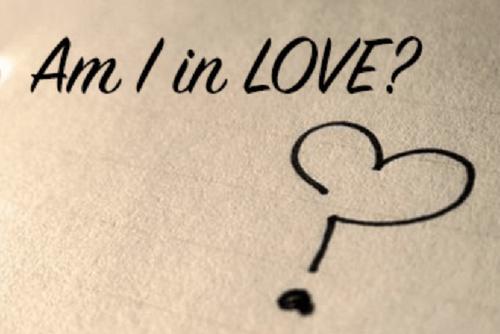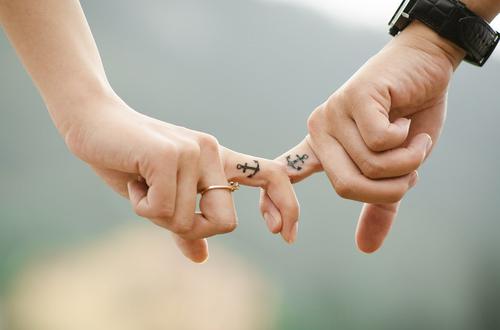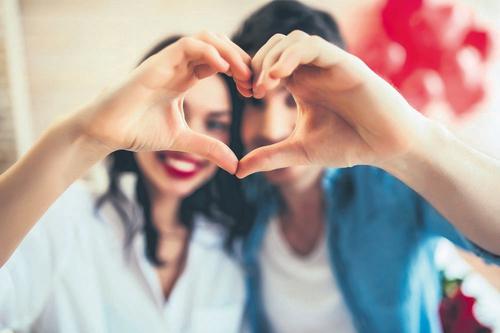How do you know if you're really in love? This is an ageless question.
When a relationship is new, the feelings you have are generally those of wanting to be together, wanting to learn more about your new partner, and looking forward to more time spent with each other. You show little signs of affection, such as leaving notes, sneezing in a kiss, or grabbing his hand.
As the relationship progresses, though, that "wanting" may turn into a "longing". You long to hear his voice, hold his hand, and feel his breath against your cheek. This is about the time you may be wondering Am I in love?
How do you know? What are the signs other than the longing you feel? How do you tell the difference between caring a lot about someone and being in love with that person?

The Science Behind Love
There is a part of your brain that is wired to react to emotional stimuli. It's called the amygdala and sits in the front portion of your brain. The amygdala is responsible for all the emotions you feel: fear, anxiety, hatred, desire, and, yes, love.
Research done at the State University of New York has demonstrated a noticeable difference in the brains of people that say they are in love compared to those who are not in love or who are just indifferent.
That difference is observed using a special kind of imaging that can see and record changes in the brain when it is stimulated by a sound or a picture. Using this imagery, your brain actually changes color in certain regions depending on what you are seeing or hearing.
In the case of those people involved in the university's study, they were shown a picture of the one with whom they were in love and also a picture of someone looking very similar. When shown the picture of the one they loved, the same parts of the brain responsible for motivation and reward reacted to that picture but not the other.
According to co-author Arthur Aron, "Intense passionate love uses the same system in the brain that gets activated when a person is addicted to drugs."
Lust vs. Attraction vs. Love
Scientists from a variety of arenas have been studying the phenomenon of love for centuries. Anthropologists and neuroscientists are among those at the forefront of research which, contrary to what has believed long ago, is all about the brain, not the heart. The heart reacts to messages from the brain. What was that?
When you lust after someone, it typically is associated with sexual desire. For example, you can say, "I lust after Brad Pitt!", meaning if given the opportunity, you'd jump into bed with him… But you can't say you "love" him in the true sense of the word, because you likely have never even met.
Stimulated purely by a physical stimulus, lust is driven by our inherent need to reproduce, although we may see it just as a need for sexual fulfillment, as in the example with Brad. When you lust after someone, testosterone and estrogen are released, which are known as the sex hormones.
When you're attracted to someone, on the other hand, a whole different set of messages is sent from the brain releasing different hormones. While you are likely attracted to someone you lust after, lust does not have the same connotation as an attraction.
Remember that the amygdala responds to stimulus around reward behavior? Those are the same pathways that are stimulated by attraction, which can lead to love. One hormone released when we feel attraction is dopamine. When we are doing something that feels good, a dopamine release creates a sort of feedback loop - we spend time with the one we love, which feels good, and so more dopamine is released.
Norepinephrine, also known as noradrenaline, is the drug we associate with the fight or flight response. It is also released at high levels when the brain feels an attraction. In combination with dopamine, the response we feel may be an increased heart rate (like when your heart is pounding in anticipation of seeing the love of your life), and lightheaded or "giddy" intense excitement or happiness (which can also lead to insomnia and loss of appetite).
How many times have you laid awake in bed, unable to sleep, because you can't get your boyfriend out of your head? And you wonder, I am in love?

Why Is It That Sometimes Love Doesn't Feel so Good?
The same hormones responsible for that feeling of euphoria are also the same ones that can generate feelings of anxiety, doubt, and jealousy. Remember that your brain has the same addictive reaction to your boyfriend as it does to a drug.
So if for some reason, you are apart from your boyfriend, not satisfying that need to see, feel, and touch him, it's the same as going through withdrawal from a drug. And without the positive stimulus, your brain is left to its own devices, so to speak, and may succumb to the opposite of those attraction feelings.
That's where your own feelings of worth and confidence come into play...they can be your best friend or your worst enemy. And you keep questioning, am I in love?
And then there's the part where you find yourself behaving in a manner that, under any other circumstance, you'd consider embarrassing. We know that with attraction and love, there comes sexual arousal. That's only normal and healthy.
But sexual arousal also seems to have the effect of turning off those regions in your brain that takes care of you and prevent you from behaving in a manner you know to be "wrong". The regrets of "the morning after" can be explained by this. "I can't believe I did that!" How many times have we all said that? So, yes, in a way, love can make us stupid.
Forget the Hormones - Our Behavior Gives You Away
Okay, so now you know it's not all in your head, or at least knowing it is all in your head because of hormones and not something you're just making believes about is comforting, right?
It's those same hormones that propel you into doing things that you wouldn't do if he was just a casual acquaintance. Our friends at Cosmo have compiled a checklist. For 10 of their 30 "sure signs", see how many of these things you do:
-
You're not counting the seconds until they text you back. What? I thought you said I couldn't wait… Well, yes, you're excited to hear back from him, but you're confident that you will, so you don't have to feel anxious.
-
When you sleepover at his place, you make the bed. You don't always do I at your own place, but doing it for him feels good. You're saving him some time and trouble.
-
Everything around you reminds you of him. Even the smallest things remind you to think of him. For example, how that crack in the sidewalk reminds you of the last walk you took holding hands, or the sign for KFC chicken makes you think about the chicken dinner you had at your place last week.
-
You're not anxious (meaning worrisome) about getting hurt. You're confident in your feelings and in his, and you know this is "real".
-
You don't always have to have "fun" on a date. Instead of focusing on the activity, you can now focus on just being together, whatever that looks like.
-
Being together is easy. You don't feel like you're "working at it" to have a good time, to make him feel comfortable, or to always have to have something to say.
-
Your conversation can turn to things you'd like to share in the future without directing it that way. The conversation takes on a life of its own and just naturally moves from one subject to another.
-
You feel safe - safe to be you, safe to be alone with him, and safe in the knowledge that you don't care what anyone else thinks.
-
There are things that annoy you or get under your skin, but they don't phase you enough to make a difference. You're able to push your annoyance away, thinking it's really not big a deal at which end he squeezes the tube of toothpaste.
-
You want to share your favorite things with him. You're not expecting him to adopt them as his favorite things; you just want him to know you better!

So What's the Bottom Line?
Love is different but the same for everyone. It can be the best thing that ever happened to you, or something you hope will never happen again. If it's all just hormones, can you fall in love with anyone? Will you constantly be asking yourself am I in love? Well, probably not, thankfully.
You still have to feel that "attraction", and yes, the lust and longing. And not every man you see will have that effect on you. We all are attracted to different physical attributes first. Some believe bald is beautiful. Others like blue eyes. An athletic physique may be your turn on, or perhaps you like a man with some extra padding.
Whatever it is, it's particular to you. Ask yourself if they are someone you'd like to plan a future with. If you'd like to have a family, ask yourself if they are someone you'd like to have children with.
Add those responses to all the other signs and symptoms, and there's your answer. If it is, indeed, love, then love long and love hard.
